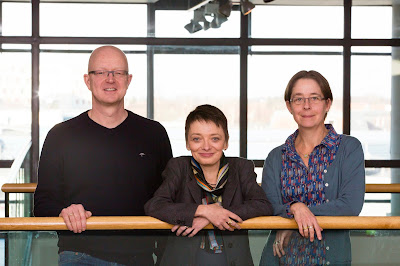End of November we learned that Inke R. König, Lars Bertram, and I are the first scientists from our university who are listed under "Highly Cited Researchers" 2018 according to Web of Science.
The criterion of frequent citation of one's own publications in the publications of other scientists is regarded as a yardstick for the rank of the respective research achievement. Inclusion in the "Highly Cited Researcher" list recognizes us for our publication activities in the newly created "Cross-Field" category.
In general, the "Highly Cited Researchers" list is an annual list of scientists and scholars who are honored for their outstanding publication work. Only publications in journals listed in the "Web of Science Core Collection" (currently comprising more than 20,000 international journals) are considered for the list. From the publications of these journals, the leading percentage is taken into account. Only those scientists who are involved in several such Highly Cited Papers at the same time are included in the circle of "Highly Cited Researchers".
The list of "Highly Cited Researchers" for the year 2018 contains the names of approximately 6000 researchers active worldwide. The statistics are based on the "Web of Science" database maintained by Clarivate Analytics (formerly Thomson Reuters), headquartered in Philadelphia, USA, which also calculates the "Journal Impact Factor" and publishes it annually. The database contains scientific articles from around 34,000 scientific journals. With a total of 356 successful scientists, Germany ranks fourth among the scientific locations after the USA, Great Britain, and China. The 2018 evaluation was based on the period from 2006 to 2016 and evaluated separately according to 21 subject areas.
Inke R. König is a Professor of Medical Biometry and Statistics with special research interests in genetic-epidemiological methods as well as in the development of prognosis models with methods of machine learning. She participates in several national and international research collaborations, in particular on the genetic basis of complex diseases.
Lars Bertram is a Professor of Genome Analysis at the University of Lübeck and researches the genetic and epigenetic causes of diseases of old age, especially in the neuropsychiatric field. In the context of this research, Prof. Bertram's research group uses various high-throughput methods for the analysis of human DNA and RNA samples, which have been collected in numerous national and international cooperation projects.
JE
The criterion of frequent citation of one's own publications in the publications of other scientists is regarded as a yardstick for the rank of the respective research achievement. Inclusion in the "Highly Cited Researcher" list recognizes us for our publication activities in the newly created "Cross-Field" category.
In general, the "Highly Cited Researchers" list is an annual list of scientists and scholars who are honored for their outstanding publication work. Only publications in journals listed in the "Web of Science Core Collection" (currently comprising more than 20,000 international journals) are considered for the list. From the publications of these journals, the leading percentage is taken into account. Only those scientists who are involved in several such Highly Cited Papers at the same time are included in the circle of "Highly Cited Researchers".
The list of "Highly Cited Researchers" for the year 2018 contains the names of approximately 6000 researchers active worldwide. The statistics are based on the "Web of Science" database maintained by Clarivate Analytics (formerly Thomson Reuters), headquartered in Philadelphia, USA, which also calculates the "Journal Impact Factor" and publishes it annually. The database contains scientific articles from around 34,000 scientific journals. With a total of 356 successful scientists, Germany ranks fourth among the scientific locations after the USA, Great Britain, and China. The 2018 evaluation was based on the period from 2006 to 2016 and evaluated separately according to 21 subject areas.
 |
| Lars Bertram, me, and Inke R König (photo credit: C. Westenberger) |
Lars Bertram is a Professor of Genome Analysis at the University of Lübeck and researches the genetic and epigenetic causes of diseases of old age, especially in the neuropsychiatric field. In the context of this research, Prof. Bertram's research group uses various high-throughput methods for the analysis of human DNA and RNA samples, which have been collected in numerous national and international cooperation projects.
JE
Comments
Post a Comment